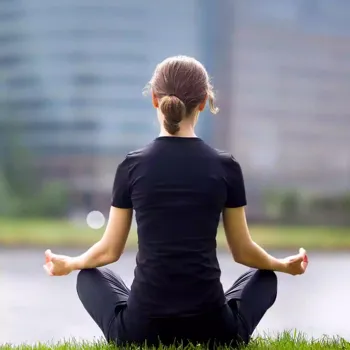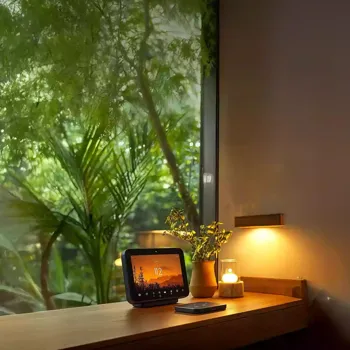Discover the transformative power of meditation. Learn how it can bring calm and clarity in a chaotic world. Read on!
In today's fast-paced world, many Bharatiyas are feeling stressed and overwhelmed. From
the pressures of work to managing family responsibilities, life can often seem like a never-ending race. This is where meditation can be a real game-changer.

It's not just some fancy trend; meditation is an ancient practice that's been shown to have some seriously amazing benefits for your mind and body. It's like hitting the reset button for your brain, helping you find inner peace, focus better, and even improve your overall health. And the best part?
Anyone can do it! You don't need any special equipment or a secluded mountaintop. You can meditate right in your own home, even if it's just for a few minutes each day.
So, if you're looking for a way to manage stress, improve your well-being, and find a little bit of calm amidst the chaos, meditation might be just what you need.
Meditation is essentially about training your mind, like exercising a muscle.
When you meditate regularly, you learn to become more aware of your thoughts and feelings without getting carried away by them. This helps you develop a sense of detachment, allowing you to observe your thoughts as they come and go, rather than reacting to them impulsively.
Think of it like watching clouds drift across the sky; you see them, but you don't chase after them. This simple act of observing without judgment can have a profound impact on your mental and emotional well-being.
It allows you to respond to situations with greater clarity and composure, rather than being driven by your emotions. Over time, regular meditation can lead to increased self-awareness, emotional resilience, and a greater sense of inner peace.
Now that Diwali is coming and offices are very hectic, mediation can provide Shanti to mind.
One of the biggest benefits of meditation is stress reduction. When you're stressed, your body goes into "fight or flight" mode, releasing stress hormones like cortisol.
Chronic stress can lead to a whole host of health problems, including high blood pressure, heart disease, and a weakened immune system. Meditation helps to counter this stress response by activating the parasympathetic nervous system, which is responsible for the "rest and digest" response.
This helps to lower your heart rate, blood pressure, and breathing rate, bringing your body back into a state of calm. Studies have even shown that meditation can alter brain activity in ways that reduce anxiety and improve mood.
So, if you're feeling stressed, taking just a few minutes to meditate each day can make a big difference in your overall well-being. Now students are giving examination, so meditation would reduce students mental stress, which will give them better performance and focus.
Beyond stress reduction, meditation can also boost your focus and concentration. In today's world of constant distractions, it's easy to lose focus and feel scattered. Meditation helps you train your attention, making it easier to stay present and focused on the task at hand.
When you meditate, you're essentially practicing bringing your attention back to a chosen focus, whether it's your breath, a mantra, or a sensation in your body. This repeated practice strengthens your ability to concentrate and resist distractions.
As you become more skilled at focusing your attention, you'll find it easier to stay on task, improve your productivity, and even enhance your creativity. Many Bharatiya companies are using meditation to improve employees engagement.
Meditation can also have a positive impact on your emotional well-being. By becoming more aware of your thoughts and feelings, you can start to understand the patterns that contribute to negative emotions like anger, sadness, and anxiety.
Meditation gives you the space to observe these emotions without judgment, allowing you to process them in a healthy way. This can lead to greater emotional resilience and a more positive outlook on life.
Studies have shown that meditation can even help to alleviate symptoms of depression and anxiety.
This is becoming more important now since marriages are breaking up, meditation can help to balance emotions of both the people
If you are looking to start meditation then, there are several types which one can try.
Here are six simple meditation techniques that are perfect for beginners:
Breath Awareness Meditation
This is one of the simplest and most accessible forms of meditation. All you need to do is find a quiet place to sit comfortably and focus your attention on your breath. Notice the sensation of the air entering and leaving your body, without trying to change or control it.
When your mind wanders, gently bring your attention back to your breath. Start with just a few minutes each day and gradually increase the duration as you become more comfortable. It can be done anywhere in home, office or travel.
Body Scan Meditation
This technique involves bringing awareness to different parts of your body, one at a time. Start by lying down comfortably and closing your eyes. Begin by focusing on your toes, noticing any sensations you feel there.
Gradually move your attention up your body, to your feet, ankles, calves, and so on, all the way to the top of your head. If you notice any tension or discomfort, simply acknowledge it without judgment and then gently move on.
This meditation helps you become more aware of your body and release tension. For senior citizens, it will be helpful.
Loving-Kindness Meditation (Metta)
This practice involves cultivating feelings of love and compassion for yourself and others. Start by sitting comfortably and closing your eyes. Begin by focusing on yourself and repeating silently, "May I be well, may I be happy, may I be peaceful, may I be free from suffering.

" Then, extend these wishes to someone you care about, then to a neutral person, then to someone you find difficult, and finally to all beings. This meditation helps to develop feelings of kindness, empathy, and connection. Families can engage this to improve bond.
Walking Meditation
This is a great option if you find it difficult to sit still for long periods. Simply walk slowly and mindfully, paying attention to the sensation of your feet touching the ground. Notice the movement of your body as you walk, and the sights and sounds around you.

When your mind wanders, gently bring your attention back to your feet and the act of walking. Walking meditation can be done indoors or outdoors. This will help senior citizens who have joint problems.
Mantra Meditation
This technique involves repeating a word or phrase (mantra) silently or aloud. Choose a mantra that resonates with you, such as "Om," "Peace," or "I am calm." Sit comfortably, close your eyes, and repeat the mantra over and over again.
When your mind wanders, gently bring your attention back to the mantra. Mantra meditation can help to quiet the mind and promote a sense of inner peace. Hindus use this to get inner peace.
Guided Meditation
If you're new to meditation, guided meditations can be a helpful way to get started. There are many free guided meditation recordings available online and through apps. These recordings typically involve a narrator who guides you through the meditation process, providing instructions and prompts.

Guided meditations can focus on a variety of themes, such as stress reduction, relaxation, or mindfulness. Some can use this to get relax in their daily stress.
Start small: Begin with just a few minutes of meditation each day and gradually increase the duration as you become more comfortable. Even five minutes of meditation can make a difference.
Be patient: It takes time and practice to develop a meditation habit. Don't get discouraged if you find it difficult to focus at first. Just keep practicing, and you'll eventually see results.
Find a quiet place: Choose a quiet place where you won't be disturbed.

This could be a corner of your bedroom, a park, or any other space where you feel comfortable and relaxed.
Be comfortable: Wear comfortable clothing and sit or lie down in a position that feels natural and relaxed. There's no need to force yourself into any particular posture.
Don't judge: When your mind wanders, don't get frustrated or judge yourself. Simply acknowledge the thought and gently bring your attention back to your chosen focus.
Be consistent: The key to reaping the benefits of meditation is to practice regularly.
Try to meditate at the same time each day, even if it's just for a few minutes.
Regular meditation has become important in current era, wherein people are facing difficulties and stress.













